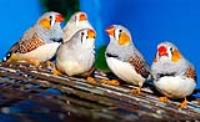 Add My Company
Add My Company
Sign In

New research has discovered a gene that links speech problems in autistic children with young songbirds who can’t learn to sing. The ground-breaking findings could lead to new treatment options for people with autism spectrum disorder.
A mutation of the FOXP1 gene believed to be responsible for people’s autism traits also affects the zebra finch and prevents it from memorising and learning songs.
Researchers at the University of Texas Southwestern Medical Centre, in the United States, believe their findings could help explain the problems with speech and language that can accompany ASD. Further research into the gene could eventually lead to new treatments to combat this aspect of the disorder.
Todd Roberts, the university’s associate professor of neuroscience, who led the study, said their goal was to determine if songbirds could be used as a model system to understand how the genes associated with autism influenced passing on behaviour from one generation to the next.
How are zebra finches affected?
The study found the linked gene affected the zebra finches’ ability to learn songs from older birds. The FOXP1 gene is found in a part of the bird’s brain known as the HVC, which roughly corresponds to the speech-related regions of the human cerebral cortex.
The HVC plays a key role in the birds’ ability to learn songs from older birds and practice singing them. It was found young birds with a fully functioning FOXP1 gene were able to sing the usual zebra finch songs.
However, chicks with a FOXP1 gene that wasn’t working properly grew up singing random songs and seemed unable to learn the adult birds’ song patterns.
Published in Science Advances, the findings explained how relatively unique vocalisations comprised a central part of human communication. Not only are they complex, but they are also handed down from adults to children to develop speech.
Songbirds such as zebra finches also learn complex vocalisations from adults – usually, the male birds pass down the songs to their offspring. Like human beings, the birds have an intricate system of brain circuitry to deal with this task. When disrupted, the bird isn’t able to learn songs properly.
How can the research help autistic children?
Roberts believes the research is important because of the parallels between humans learning language and birds learning songs. Due to the similarities, the songbirds are a useful scientific model to understand children’s speech development and why it may be impaired. He says new techniques focusing on helping children to form speech memories may be important in the future, as modifying the FOXP1 gene using pharmaceuticals could help avoid speech deficits.
One of the symptoms of ASD is an impaired ability to interact with others from as early as one to two years of age. While ASD is often defined by social and communication difficulties, affected individuals are likely to have a wide range of intellectual abilities. Some have above-average intelligence, but may not speak at all, or they can have problems associated with verbal communication.
Roberts and his team now plan to conduct further research to develop their findings, with the goal of helping people with autism.
Children who have Autism Spectrum Disorder may have sleep problems, resulting in daytime tiredness and learning and behavioural issues. Kinderkey provides specialist beds for people with autism to create a safe and comfortable sleep environment.
Please contact us on 01978 820714 or contact@kinderkeyinternational.co.uk for further information.
For more information on How Songbirds and Autistic Children are Alike talk to Kinderkey Healthcare Ltd
Enquire Now
List your company on FindTheNeedle.

